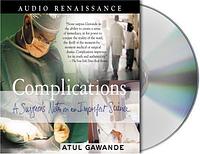You need to sign in or sign up before continuing.
Take a photo of a barcode or cover
520 reviews for:
Complications: A Surgeon's Notes on an Imperfect Science by Atul Gawande
Atul Gawande, Atul Gawande
520 reviews for:
Complications: A Surgeon's Notes on an Imperfect Science by Atul Gawande
Atul Gawande, Atul Gawande
An editor I know recommended this book as a lesson in scene setting. Indeed, Gawande is excellent at drawing a scene with characters that easily draw you in and creating an environment in which you can envision the hospital drama unfolding. I also appreciated his blending of research and narrative such that you don't realize you are reading much narrative. Lastly, his use of medical detail was graphic at times, but appropriate to relay that this book, in fact, is about surgery. Great book.
informative
medium-paced
challenging
informative
reflective
medium-paced
Loved this book. It gave me good insight into what my husband's life was like as a resident. Looking forward to reading this author's newest book.
“These are the moments in which medicine actually happens.”
The author describes some of the notable medical cases he has seen as a surgical resident, and how uncertain yet promising the art of medicine is. As a current medical student, I found it eye-opening and somewhat frightening to think about the challenge of helping patients make the life-changing decisions the author discusses.
Strengths:
- Eloquently written; clear, succinct, and pleasing to read
- Truly fascinating medical cases are discussed, especially from the eyes of a doctor
- A unique look at what the training of a surgical resident is like, and how doctors are formed
- An unflinching look into how much uncertainty is inherent in medicine and the unique role healthcare providers play in navigating it
Watch out for:
- The organization of the book was more like a series of slightly connected articles rather than one cohesive narrative, but the overall impact of the book does not suffer for it
The author describes some of the notable medical cases he has seen as a surgical resident, and how uncertain yet promising the art of medicine is. As a current medical student, I found it eye-opening and somewhat frightening to think about the challenge of helping patients make the life-changing decisions the author discusses.
Strengths:
- Eloquently written; clear, succinct, and pleasing to read
- Truly fascinating medical cases are discussed, especially from the eyes of a doctor
- A unique look at what the training of a surgical resident is like, and how doctors are formed
- An unflinching look into how much uncertainty is inherent in medicine and the unique role healthcare providers play in navigating it
Watch out for:
- The organization of the book was more like a series of slightly connected articles rather than one cohesive narrative, but the overall impact of the book does not suffer for it
informative
inspiring
reflective
fast-paced
informative
medium-paced
Most lay people expect physicians to perform miracles. After all, the have completed a strenuous academic program and spent years in clinical practice. This view is reinforced by books, television shows, and movies. Dr. Gawande, a surgeon and faculty at one of the most prestigious health care facilities in the USA, pulls the curtain aside to show us, from a surgeon’s perspective, the humanity of physicians practicing an imperfect science. Through several well-told and interesting case histories various fundamental principles are covered that impact the doctor-patient relationship. The cases that he talks about are from his residency days (clinical training after finishing medical school). There is mention of an attending physician who did not hesitate to say, “I don’t know” when he could not answer patients’ questions. Physicians consult with each other because they are unsure what to do for a particular patient. A hospital specializes on a particular type of surgical procedure and performs it to perfection. A previous case led to a questionable but ultimately life-saving decision for a young woman and illustrated that, sometimes, hoof marks are indicative of zebras rather than horses. The relative lack of evidence-based national treatment guidelines, such as NICE in the UK, leads to divergent treatment philosophies in different parts of the USA, just to name a few. Each case concept is replete with multiple studies that are cited in the back of the book and provide additional reading for those who wish to study the topics in deeper detail. An easy-to-read book that ultimately begs the question on how healthcare can be elevated beyond the level of the individual practitioner and patient. Unfortunately, Dr. Gawande does not address this question.
informative
reflective
tense
slow-paced
Interesting and readable account of what transpires day to day in the life of a doctor, or more precisely, a surgeon.
Broken down into three parts - Fallibility, Mystery, and Uncertainty, these are accounts that revolve around themes, and ultimately probe the questions that come up during treatment, and beyond.
How are decisions made? What happens when a doctor goes "bad"? Why do some procedures work fine for some but the same procedure fails for others?
A highly recommended look into the field of medicine.
Broken down into three parts - Fallibility, Mystery, and Uncertainty, these are accounts that revolve around themes, and ultimately probe the questions that come up during treatment, and beyond.
How are decisions made? What happens when a doctor goes "bad"? Why do some procedures work fine for some but the same procedure fails for others?
A highly recommended look into the field of medicine.





